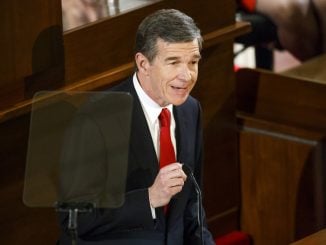RALEIGH — Lt. Gov. Dan Forest has given nearly $200,000 from his gubernatorial campaign fund to people and businesses needing assistance due to the economic downturn caused by COVID-19, according to his campaign committee.
Forest campaign manager Hal Weatherman disclosed the donations on Monday in a video in which he criticized Democratic incumbent Roy Cooper for a recent fundraising plea by his campaign. The two won their primaries last month and will face each other in the fall.
As Cooper was “pressuring people to help you meet your political fundraising goals, (Forest) gave targeted financial assistance directly from his campaign account,” Weatherman said. “Most of the people he assisted he had never met. Most did not even know he was the lieutenant governor or running for governor of this great state.”
The disclosure comes as Cooper has held a large campaign fundraising advantage over Forest. Cooper’s campaign had $9.5 million in cash as of mid-February, compared with about $750,000 for Forest. Forest criticized Cooper last month for failing to obtain majority support from the Council of State before issuing an order barring dine-in service by restaurants. Cooper’s office said he wasn’t required to receive the council’s endorsement to act.
Cooper campaign spokeswoman Liz Doherty said late Monday that Forest “continues to inject politics and confusion into a public health crisis. Ever since this pandemic started in North Carolina, Dan Forest has picked politics over protecting the health and safety of North Carolinians.”
Cooper has held the media spotlight for weeks while leading the state’s response to the new coronavirus, including the issuance of executive orders shuttering businesses and limiting mass assemblies to dull its spread and save hospital beds.
Forest campaign spokesman Andrew Dunn declined to provide details Monday of the COVID-19 donation recipients. But he acknowledged they would be made public in his next finance report, due in July.
Dunn said state law allowed Forest to expend campaign funds on individuals and businesses. He cited provisions allowing expenditures resulting from being a candidate and holding public office, as well as donations to charity. Dunn also cited a 2006 opinion from the then-state elections director saying it’s permissible to give “gifts” under certain circumstances.



